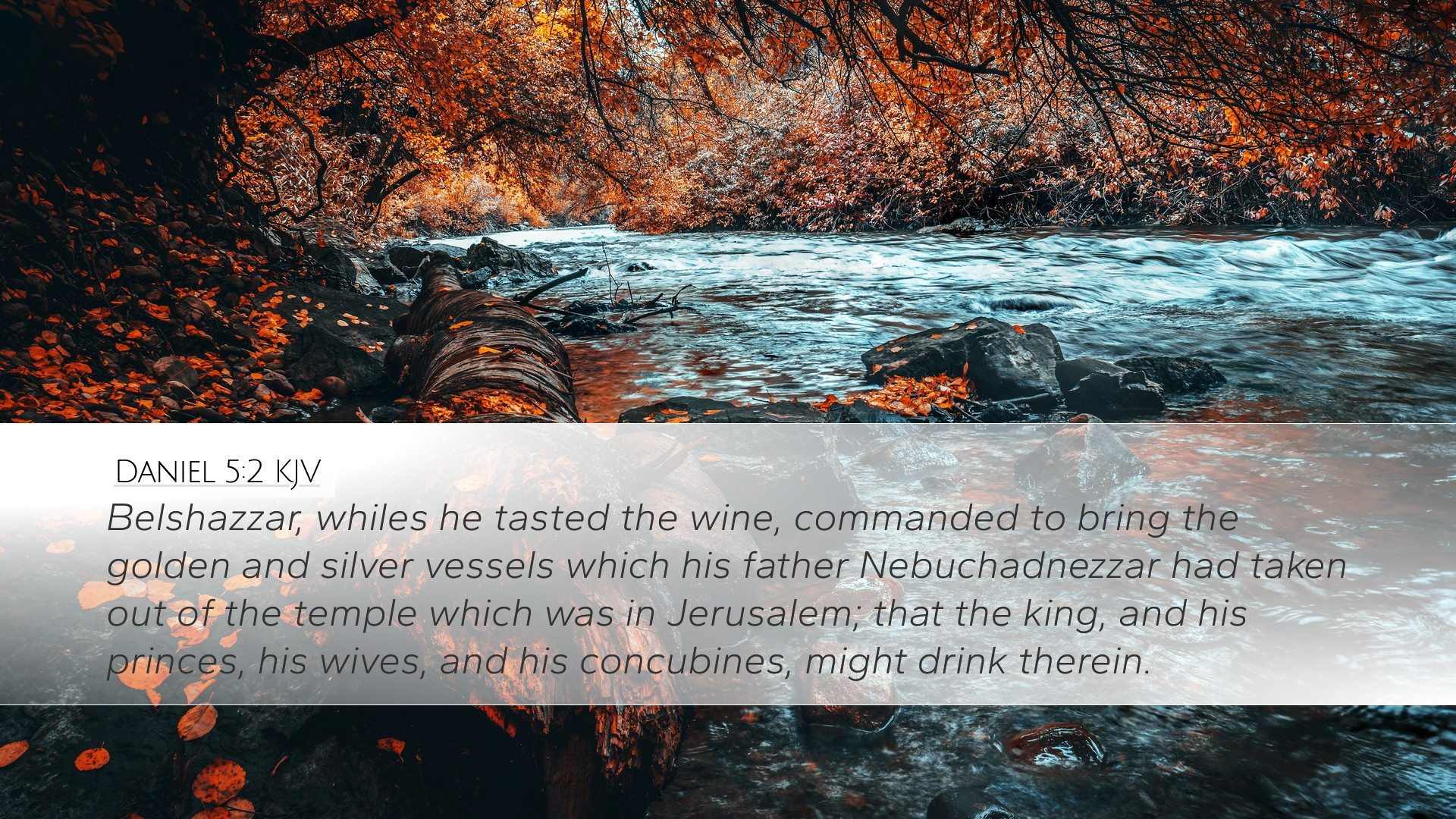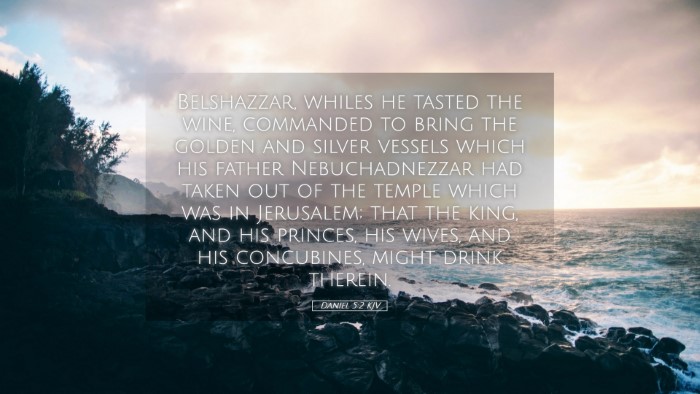Bible Commentary on Daniel 5:2
Daniel 5:2 states: "Belshazzar, while he tasted the wine, commanded to bring the golden and silver vessels which his father Nebuchadnezzar had taken out of the temple which was in Jerusalem; that the king, and his princes, his wives, and his concubines, might drink therein."
Contextual Background
The verse arises during a pivotal moment in Babylonian history, specifically during the reign of Belshazzar, the last king of Babylon. Historical records suggest that Belshazzar was co-regent and the grandson of Nebuchadnezzar.
This moment is significant as it encapsulates the themes of pride, sacrilege, and impending judgment that are prevalent throughout the Book of Daniel.
Commentary Insights
Matthew Henry's Commentary
Matthew Henry emphasizes the reckless behavior of Belshazzar in this verse. He points out that while in a state of drunken revelry, the king commands the use of sacred vessels from the Jewish Temple. Henry suggests that by doing this, Belshazzar not only dishonored God but also tested divine patience.
This act of sacrilege can be seen as a mockery of the God of Israel, showing Belshazzar's arrogance and disregard for the consequences of his actions. Henry notes that this event marks a turning point, foreshadowing divine judgment against Babylon.
Albert Barnes' Commentary
Albert Barnes provides insight into the historical implications of this verse. He notes that the vessels taken from the Temple were emblematic of God’s presence among His people. To use them for a profane feast was to directly challenge the sovereignty of God.
Barnes explains that Belshazzar's actions were indicative of the spiritual decline of Babylon and a historical climax that led to its downfall. He underscores the idea that pride precedes destruction, as this lavish banquet was being held amidst the very real threat of the Persian army outside Babylon's walls.
Adam Clarke's Commentary
Adam Clarke offers a detailed analysis of the significance of the words “while he tasted the wine.” He underlines that this phrase indicates a state of inebriation, suggesting that the king’s judgment was impaired. Clarke associates Belshazzar’s excesses not just with drunkenness but also with moral degradation.
Clarke further argues that the king’s actions demonstrate a brazen defiance against the history of his forefather, Nebuchadnezzar, who had previously acknowledged the sovereignty of God. This stark contrast emphasizes the blindness that often accompanies opulence and indulgence in worldly pleasures.
Theological Implications
This verse invites deeper reflection on the nature of worship and the appropriate reverence towards God. The act of using consecrated items for profane purposes highlights a serious theological principle: the holiness of God cannot be trivialized.
- Consecration vs. Profanation: The importance of sacred objects in worship reflects God's desire for holiness among His people.
- The Danger of Complacency: Belshazzar's overindulgence serves as a warning for contemporary believers against the dangers of moral laxity.
- Judgment and Accountability: The impending judgment that Belshazzar faced reiterates the biblical truth that leaders and nations are accountable to God for their actions.
Practical Applications
For pastors and theologians, Daniel 5:2 can serve as a sermon illustration regarding the necessity of holiness in worship. The misuse of sacred elements can parallel how modern society often trivializes spiritual truths.
- Call to Holiness: Believers should strive for purity in both personal conduct and corporate worship.
- Reflection on Leadership: The consequences of leadership decisions can have significant ramifications; thus, integrity is paramount.
- Understanding of God’s Sovereignty: This narrative reinforces the belief in God's ultimate authority over kingdoms and rulers.
Conclusion
Daniel 5:2 encapsulates powerful themes of pride, judgment, and the consequences of irreverence toward the sacred. By drawing on the insights of historical commentaries, we see the rich tapestry of lessons embedded within this single verse, providing timeless relevance for today's religious landscape.


